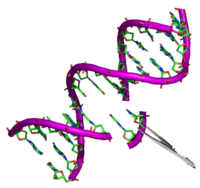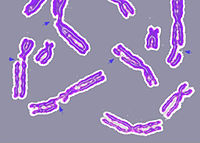
MED12 interacts with the heat‐shock transcription factor HSF1 and recruits CDK8 to promote the heat‐shock response in mammalian cells
Sign Up to like & getrecommendations! Published in 2021 at "FEBS Letters"
DOI: 10.1002/1873-3468.14139
Abstract: Activated and promoter‐bound heat‐shock transcription factor 1 (HSF1) induces RNA polymerase II recruitment upon heat shock, and this is facilitated by the core Mediator in Drosophila and yeast. Another Mediator module, CDK8 kinase module (CKM),… read more here.
Keywords: heat shock; shock transcription; hsf1; heat ... See more keywords

The Mediator subunit MED12 promotes formation of HSF1 condensates on heat shock response element arrays in heat-shocked cells.
Sign Up to like & getrecommendations! Published in 2023 at "FEBS letters"
DOI: 10.1002/1873-3468.14617
Abstract: Upon heat shock, activated heat shock transcription factor 1 (HSF1) binds to the heat shock response elements (HSEs) in the promoters of mammalian heat shock protein (HSP)-encoding genes and recruits the preinitiation complex and coactivators,… read more here.
Keywords: hsf1 condensates; heat; shock response; heat shock ... See more keywords

Is there a role for HSF1 in viral infections?
Sign Up to like & getrecommendations! Published in 2022 at "FEBS Open Bio"
DOI: 10.1002/2211-5463.13419
Abstract: Cells undergo numerous processes to adapt to new challenging conditions and stressors. Heat stress is regulated by a family of heat shock factors (HSFs) that initiate a heat shock response by upregulating the expression of… read more here.
Keywords: heat shock; viral infections; heat; hsf1 viral ... See more keywords

Esterified Trehalose Analogues Protect Mammalian Cells from Heat Shock
Sign Up to like & getrecommendations! Published in 2017 at "ChemBioChem"
DOI: 10.1002/cbic.201700302
Abstract: Trehalose is a disaccharide produced by many organisms to better enable them to survive environmental stresses, including heat, cold, desiccation, and reactive oxygen species. Mammalian cells do not naturally biosynthesize trehalose; however, when introduced into… read more here.
Keywords: trehalose analogues; esterified trehalose; heat shock; mammalian cells ... See more keywords

Screening of Inhibitors Targeting Heat Shock Protein 47 Involved in the Development of Idiopathic Pulmonary Fibrosis
Sign Up to like & getrecommendations! Published in 2021 at "ChemMedChem"
DOI: 10.1002/cmdc.202100064
Abstract: Heat shock protein 47 (HSP47), a collagen‐specific molecular chaperone, is causally related to fibrotic diseases, including idiopathic pulmonary fibrosis. The identification of Compounds that interfere with the HSP47‐collagen interaction is essential for the development of… read more here.
Keywords: protein; idiopathic pulmonary; heat shock; pulmonary fibrosis ... See more keywords

Genotypic-specific heat shock response of vector susceptibility to Schistosoma mansoni.
Sign Up to like & getrecommendations! Published in 2022 at "Ecosphere"
DOI: 10.1002/ecs2.4207
Abstract: Living organisms are vulnerable to thermal stress which causes a diversity of physiological outcomes. Previous work has shown that the snail vectors (Biomphalaria glabrata) of an important human pathogen, Schistosoma mansoni, revert from resistant to… read more here.
Keywords: schistosoma mansoni; heat; heat shock;

Heat shock protein 47 as indispensible participant in liver fibrosis: Possible protective effect of lactoferrin
Sign Up to like & getrecommendations! Published in 2018 at "IUBMB Life"
DOI: 10.1002/iub.1884
Abstract: Lactoferrin (LF) was previously suggested to have a protective effect against liver fibrosis by preventing hepatic stellate cells (HSCs) activation. The effect of LF on heat shock protein 47 (HSP47) has not yet been studied… read more here.
Keywords: liver fibrosis; protective effect; effect; heat shock ... See more keywords

The role of heat shock proteins in metastatic colorectal cancer: A review
Sign Up to like & getrecommendations! Published in 2022 at "Journal of Cellular Biochemistry"
DOI: 10.1002/jcb.30326
Abstract: Heat shock proteins (HSPs) are a large molecular chaperone family classified by their molecular weights, including HSP27, HSP40, HSP60, HSP70, HSP90, and HSP110. HSPs are likely to have antiapoptotic properties and participate actively in various… read more here.
Keywords: shock proteins; colorectal cancer; cancer; heat shock ... See more keywords

c‐Src kinase contributes on endothelial cells mechanotransduction in a heat shock protein 70‐dependent turnover manner
Sign Up to like & getrecommendations! Published in 2019 at "Journal of Cellular Physiology"
DOI: 10.1002/jcp.27787
Abstract: Shear stress changes are associated with a repertory of signaling cascade modulating vascular phenotype. As shear stress‐related tensional forces might be associated with pathophysiological susceptibility, a more comprehensive molecular map needs to be addressed. Thus,… read more here.
Keywords: protein; turnover; shear stress; mechanotransduction ... See more keywords

Heat Shock Protein 60 in Obesity: Effect of Bariatric Surgery and its Relation to Inflammation and Cardiovascular Risk
Sign Up to like & getrecommendations! Published in 2017 at "Obesity"
DOI: 10.1002/oby.22014
Abstract: Heat shock protein 60 (Hsp60) is an adipokine, and its serum concentrations are higher in patients with obesity compared to lean patients. This study aimed to analyze the effect of bariatric surgery on circulating concentrations… read more here.
Keywords: effect bariatric; bariatric surgery; heat shock; shock protein ... See more keywords

Over‐Expression of RNA Processing, Heat Shock, and DNA Repair Proteins in Breast Tumor Compared to Normal Tissue
Sign Up to like & getrecommendations! Published in 2020 at "PROTEOMICS"
DOI: 10.1002/pmic.202000044
Abstract: This study identifies the main changes in protein expression in human breast tumors compared to normal breast tissue. Malignant tumors (32) and normal breast tissue samples (23), from formaldehyde‐fixed, paraffin‐embedded specimens are subjected to discovery… read more here.
Keywords: compared normal; dna repair; shock dna; tissue ... See more keywords